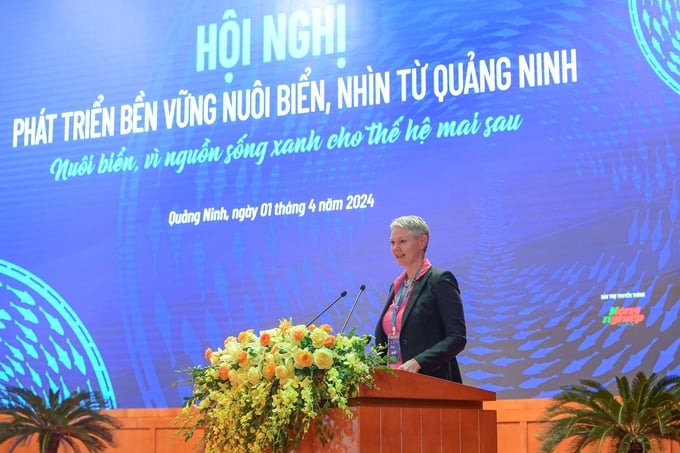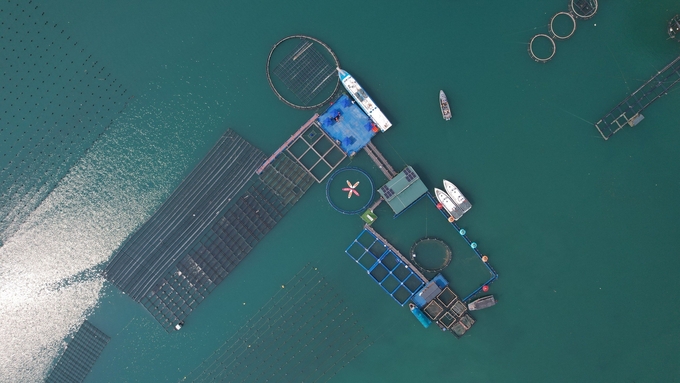May 30, 2025 | 14:42 GMT +7
May 30, 2025 | 14:42 GMT +7
Hotline: 0913.378.918
May 30, 2025 | 14:42 GMT +7
Hotline: 0913.378.918
For over forty-year of cooperation, Norway and Vietnam have worked closely together in the fisheries sector, laying a strong foundation for offshore aquaculture development. This sector has proven effective not only in environmental terms, since a blue economy relies on healthy oceans but also in terms of high productivity. With long coastlines, both nations have a competitive advantage in seafood exports, underpinned by a strong commitment to bilateral marine farming cooperation.
The Vietnam Agriculture Newspaper proudly highlights milestones in sustainable marine farming collaboration between Vietnam and Norway.
As a country rich in marine resources, Norway has long benefited from ocean-based industries, which are a core strength of its economy. Aquaculture has historically been interwoven with the economic, social, and historical fabric of Norway's coastal communities, with science-driven solutions prioritized in marine farming.
With its rich tradition in fisheries, Norway has played a crucial role in supporting Vietnam in conceptualizing marine aquaculture, culminating in Decision 1664/QĐ-TTg in 2023, which promotes aquaculture development in the East Sea. This policy aims to expand marine farming areas and increase export revenue by 2030, with a vision toward 2045.
Mrs. Hilde Solbakken, Norwegian Ambassador to Vietnam, emphasized that sustainable marine economic development must begin with a comprehensive understanding of weather patterns. Scientific hydrological data serves as the basis for planning farming zones, ensuring fish farms and fishing vessels can withstand unique wind and wave conditions. Norway supports Vietnam in establishing standards for farm design, zoning, and climate resilience.
At the Conference on Sustainable Marine Farming Development in Quang Ninh in April 2024, Vietnam's vast potential for marine resource exploitation and economic growth was reaffirmed as a top priority.

Norwegian Ambassador to Vietnam, Hilde Solbakken, shared her expertise in marine aquaculture at the Sustainable Marine Farming Development Conference - Viewing from Quang Ninh on April 1. Photo: Tung Dinh.
Ambassador Solbakken praised Vietnam’s proposal: “Your policies harmoniously integrate economic development with ecosystem and biodiversity protection while leveraging resources from industries such as oil and gas, shipbuilding, and maritime transportation. Many Norwegian companies are interested in the shipbuilding industry and offshore wind value chains in Vietnam.”
Vietnam’s openness also attracts Norwegian enterprises, particularly those in aquaculture equipment manufacturing. Shared interests in maritime and green shipping sectors open up robust cooperation opportunities between the two nations.
Decades of collaboration between the Vietnam Meteorological and Hydrological Administration and the Norwegian Meteorological Institute have facilitated effective knowledge-sharing in oceanographic management. Using models that analyze data on wave dynamics, water levels, wave directions, and currents, both sides have accurately forecasted the impacts of climate change on coastal areas, enabling proactive response planning.
“For Vietnam’s fisheries sector, marine spatial planning and integrated industry planning are key areas where Norway seeks to provide support,” said Ambassador Solbakken. She highlighted the comprehensive role of marine spatial planning for aquaculture and fishing, especially amid increasing climate change and natural disasters. Coordination among blue economy sectors is critical for preparing for risk scenarios.

Nuôi biển Quảng Ninh thiệt hại nặng nề sau thiên tai. Ảnh: Nguyễn Thành.
Norway has shared its expertise, promoted research, transferred technology, and established equipment standards to help Vietnam develop large-scale offshore fish farms.
In light of the severe damage caused by Typhoon Yagi, insurance for small-scale fishers and aquaculture farms has become a key focus. Ambassador Solbakken emphasized, “To prepare for the future, as climate change impacts become more evident, it’s vital to provide loans to upgrade facilities to meet new standards. This is an essential step to tackle environmental challenges Vietnam faces and will continue to encounter.”
Sharing Norway’s aquaculture experience, Ambassador Solbakken noted the impact of extreme weather on Norwegian seas. Rising sea temperatures have altered fish habitats, forcing them to migrate to cooler waters.
“Our fishers must now venture further offshore or to other regions, facing new challenges. Additionally, even a slight increase in offshore wind speeds can significantly reduce the number of fishing days in a year,” she explained.
To address these changes, the Norwegian government has prioritized improving databases and advancing marine science research. Many studies, guided by United Nations climate change reports, have been tailored to Norwegian waters. The resulting data has enhanced weather and climate forecasting systems, supporting fishers and ocean industries in adapting to environmental changes.
Both Norway and Vietnam share a common interest in protecting the oceans and maintaining marine ecosystem balance. Bilateral cooperation, whether direct or indirect, aims to achieve these goals. Ambassador Solbakken emphasized that bilateral collaboration is robust, particularly as Vietnam has identified marine aquaculture as a priority sector, with sustainability as its guiding principle.
Beyond economic development, Vietnam and Norway are working together on marine environmental protection projects, including initiatives to reduce plastic waste. Specific activities include programs to support fishers in collecting plastic waste for port processing, building recycling facilities, connecting independent waste collectors with recycling entities, and integrating recycled materials into the economic value chain.
Norway also collaborates with Vietnam’s cement industry, applying advanced technologies to replace coal with non-recyclable plastics and low-value waste. This approach reduces greenhouse gas emissions and improves waste management efficiency.
Translated by Kieu Chi

(VAN) Ms. Nguyen Thi Dung, Deputy Director of Ngoc Hoang Cooperative, shared about the journey of bringing dragon fruit to Europe, achieving annual revenues in the billions of VND.

(VAN) Bamboo products from Thang Tho Bamboo Cooperative have reached many countries around the world, while also creating jobs for local workers.

(VAN) The Management Board of Con Dao National Park reported that a green sea turtle, tagged in the Philippines, has traveled thousands of kilometers to lay 84 eggs on Bay Canh Islet.

(VAN) Green technology is paving a new path for sustainable aquaculture in the Mekong Delta in particular and across the country in general, helping reduce emissions and adapt to climate change.

(VAN) On May 27, La French Tech Vietnam (the French startup and innovation community in Vietnam) held the French Tech Summit Vietnam 2025.
/2025/05/27/4731-2-223159_980.jpg)
(VAN) No votive paper, no styrofoam, no plastic bags, no plastic bottles, and no single-use plastic trays are the key rules tourists should keep in mind when visiting Con Dao.

(VAN) In the fight against plastic pollution, Vietnam has been demonstrating a proactive, pioneering, and active role in addressing the greatest environmental challenge today.